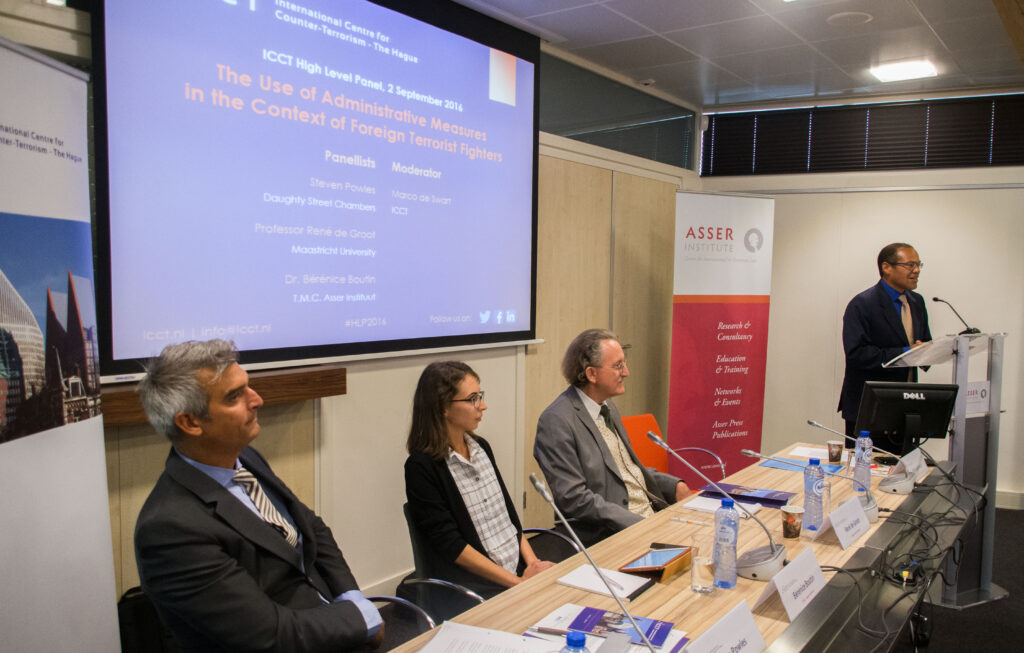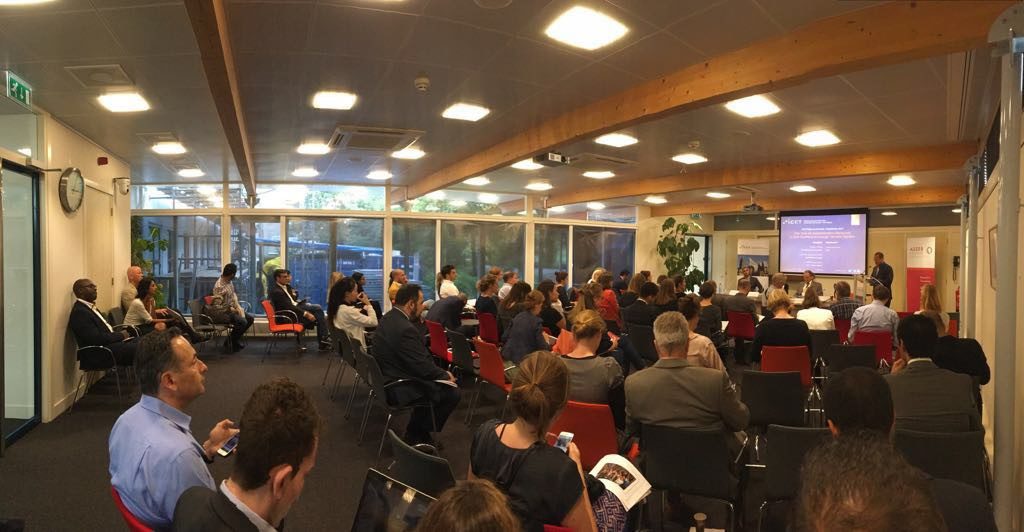On 2 September 2016, ICCT and the Asser Institute convened a High Level Panel on the topic of The Use of Administrative Measures in the Context of Foreign Terrorist Fighters (FTFs). Opening the Panel, ICCT Senior Portfolio Manager Marco de Swart gave a short introduction about ICCT and its yearly Summer Programme on counter-terrorism, of which the High Level Panel is traditionally the last event.
After welcoming the speakers – Steven Powles of Doughty Street Chambers, Professor René de Groot of Maastricht University and Dr. Bérénice Boutin of the T.M.C. Asser Instituut – the topic of administrative measures was outlined briefly. During the past years, several governments have decided to apply administrative measures to FTFs as an alternative to prosecution through the criminal justice system. These measures include, amongst other things, deprivation of nationality, travel bans, confiscation of travel documents, prevention of re-entry, freezing of funds and cancellation of social benefit payments. Under which circumstances and to what extent such measures should be applied is subject of much debate in countries of origin, transit and destination of FTFs.
TPIMs and Asset Freezing - the Case of the United Kingdom
Speaking first, Steven Powles elaborated on the history and development of administrative measures in the UK, focusing in particular on Terrorism Prevention and Investigation Measures (TPIMs) and asset freezing as the two main tools employed by the UK in the fight against FTFs outside the criminal justice system. Powles emphasised that administrative measures in the terrorism context are relatively new in the UK: while it was a priority to criminally prosecute IRA fighters in the 1970s – in the absence of measures equivalent to today’s administrative measures – the attacks of 9/11 represented the starting point for new counter-terrorism legislation allowing for the restriction of certain liberties of terrorist suspects. Such legislative measures initially included indefinite administrative detention of non-British citizens (declared unlawful in 2004), and control orders which could include measures such as house arrest, curfews or forced relocation.
After control orders were deemed contrary to the European Convention on Human Rights, the British government replaced them with TPIMs in 2011. These are criticised as still being “control orders light”, argued Powles, as measures restricting the liberty of suspects are not perceived to have substantially changed. Another point on which TPIMs continue to be criticised is the so-called ‘special advocate’ procedure, by which secret evidence can be relied upon in reviews in High Court while being withheld from the accused or his legal team. Solely a ‘special advocate’ – a security-cleared barrister entrusted with representing the subject during litigation – is granted full disclosure of said evidence, raising procedural concerns of fairness and speediness of trials.
Powles cited similar concerns about another UK administrative measure – asset freezing – whereby subjects need to acquire a licence from the Treasury to receive any amount of money, resulting in a considerable impact on the private lives of individuals concerned. Likewise, he indicated that it can take up to 1.5 years for these cases to come before court for review. Powles underlined the fact that, just as for the other administrative measures mentioned, a tension exists between the need to safeguard the general public and the rights of those subjected to such measures.
Steven Powles at the ICCT High Level Panel 2016:
[video width="640" height="360" mp4="https://icct.nl/wp-content/uploads/2016/09/Steven-Powles-HLP-2016.mp4"][/video]
Deprivation of Nationality in the Netherlands and Abroad
Following the contribution of Steven Powles, Professor René de Groot elaborated on the question of whether deprivation of nationality should be used as a weapon against jihadists. The practical relevance of this question is shown in the current legislative proposal before the Dutch Senate which would provide for the possibility of immediate deprivation of nationality of dual nationals suspected of being member of a terrorist organisation. In his response to the aforementioned issue, de Groot reviewed international and national legislation in other countries, noting that several states had indeed passed similar laws or proposals for such laws, while international legal conventions impose strict limits for the deprivation of nationality. Countries that have passed legislation on the deprivation of nationality include Australia, Austria, Belgium, Canada and the UK. The relevant bodies of international legislation are Art. 15 of the Universal Declaration of Human Rights (2015), Art. 8 of the 1961 Convention on the reduction of statelessness and Art. 7 of the Convention on Nationality 1997.
Comparing the Dutch legislative proposal to the obligations imposed by both conventions to which the Netherlands are a contracting party, Professor de Groot then assessed the merit of the proposal as inadequate on multiple accounts. Firstly, the goal of the law – intended as either a preventive or reactive measure – is dubious. While the former would violate international standards, the latter would merely add to existing national legislation covering the same circumstances. Secondly, the law would discriminate against Dutch nationals with dual or multiple nationality, in particular those who cannot renounce their other nationality. Thirdly, judicial control over the process is rather weak, for instance, lacking a criminal procedure to determine the deprivation. Fourthly, deprivation of nationality weakens the international criminal jurisdiction of the Netherlands, while at the same time exporting risks as individuals deprived of Dutch nationality are more likely to join terrorist forces or go to the country of their other nationality, thereby endangering the stability there. Lastly, the proposal is highly selective in whom it targets – Islamic State and al Qaeda are on the black list, but the FARC, PKK or Tamil Tigers are not. Similarly, the loss of nationality only applies to adults, whereas individuals under 18 years of age will remain Dutch citizens. Concluding, Professor de Groot argued that the proposal endangers both non-discrimination and strong procedural safeguards, two core values of the Dutch society.
Professor René de Groot at the ICCT High Level Panel 2016:
[video width="640" height="360" mp4="https://icct.nl/wp-content/uploads/2016/09/Rene-de-Groot-HLP-2016.mp4"][/video]
The Need for Safeguards in Using Administrative Measures – the Case of France
Concluding the panel discussion, Dr. Bérénice Boutin elaborated on the extent of the use of administrative measures in France, arguing that their application has raised numerous concerns regarding human rights and due process of individuals targeted.
Reviewing first the variety of administrative measures that France has applied, Dr. Boutin cited travel and entry bans, deprivation of nationality, house arrests, area bans and the conduct of warrantless searches, the latter three being part of a package of increased powers given to French executive authorities under the ongoing state of emergency initially declared in November 2015. According to Dr. Boutin, more than 3,500 warrantless searches, 500 house arrests, and 540 area bans have been ordered since then.
While the nature of administrative measures, which are applied with the aim of preventing terrorist activity from happening, is beneficial in some instances (e.g. travel bans are useful in immediately stopping an individual attempting to travel to Syria), they have come under criticism for providing a convenient means to circumvent the procedural constraints of criminal trials, such as evidentiary requirements. So-called “white notes” – unsigned and undated documents stating that an individual poses a threat to public order and security without fully disclosing why – serve as the basis for the application of administrative measures. Similarly, these measures have been criticised for having an excessive impact on the human rights of targeted individuals, such as the right to freedom of movement or the right to private and family life. Looking at the bigger picture, moreover, other salient issues can be ascertained: Dr. Boutin argues that French authorities have been in a state of “legislative fever”, passing more and more laws that either duplicate existing provisions or allow for administrative measures of questionable efficiency. Likewise, with the state of emergency having been renewed four times since November 2015, temporary, exceptional measures are in danger of being perceived as increasingly normal and permanent.
Dr. Bérénice Boutin at the ICCT High Level Panel 2016:
[video width="640" height="360" mp4="https://icct.nl/wp-content/uploads/2016/09/Berenice-Boutin-HLP-2016.mp4"][/video]





